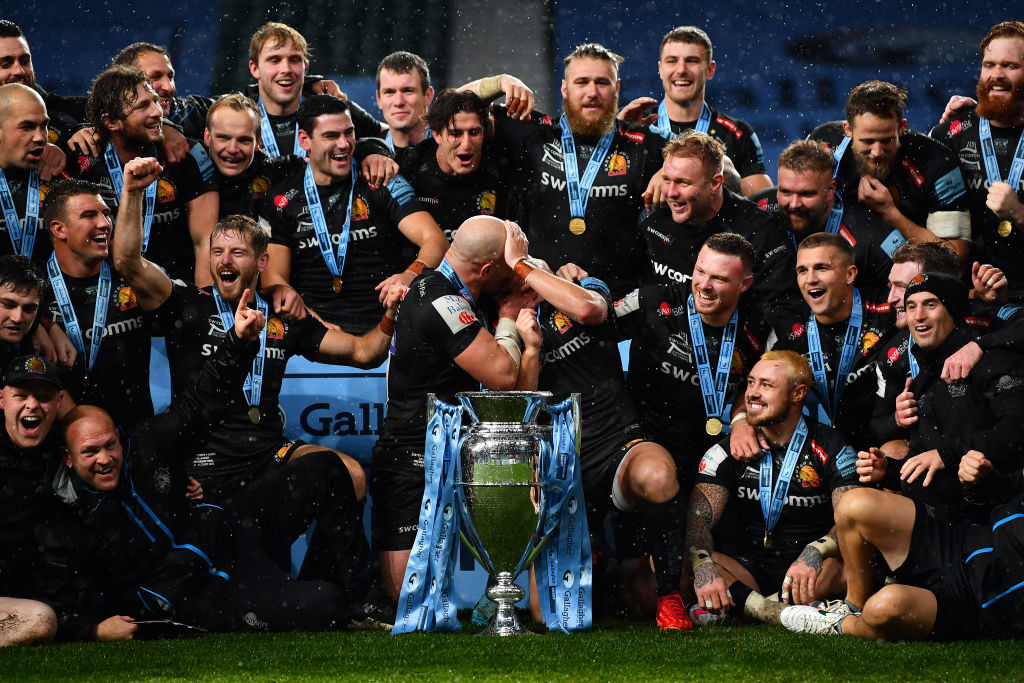New book explains how Rob Baxter’s ascension at Exeter Chiefs wasn’t without detractors

LONDON, ENGLAND - OCTOBER 24: Jack Yeandle of Exeter Chiefs kisses Joe Simmonds of Exeter Chiefs following their team's victory during the Gallagher Premiership Rugby Final between Exeter Chiefs and Wasps at Twickenham Stadium on October 24, 2020 in London, England. Sporting stadiums around the UK remain under strict restrictions due to the Coronavirus Pandemic as Government social distancing laws prohibit fans inside venues resulting in games being played behind closed doors. (Photo by Dan Mullan/Getty Images)
Eleven years after anointing the man who launched an era of Exeter Chiefs glory, chairman Tony Rowe has revealed how double-winning supremo Rob Baxter was far from a unanimous choice as the club’s head coach following Peter Drewett’s sacking in March 2009.
Drewett’s dismissal after a damaging Championship defeat to Moseley paved the way for Baxter to establish a Devon dynasty that culminated in last month’s Premiership and Champions Cup success.
However, in a fascinating new book due to be published on Thursday, Rowe explains how the Sandy Park board, which included Baxter’s father, John, were split over appointing then-forwards coach Rob, with some favouring a bigger name like ex-England scrum-half Richard Hill.
In Exe Men: The Extraordinary Rise of Exeter Chiefs, Rowe tells author Robert Kitson: “Half my board of directors voted against it. Half the club were Baxters and half were against.
“You could have split the club down the middle. Not everyone loved John Baxter. There were two board members I know well who voted against it. I remind them of that every now and again.”
With the board split, Rowe recalls having the casting vote, adding: “I said, ‘We’ve got to do it.’ I remember calling in Rob to tell him. He thought he was in for the chop!”
Within weeks Baxter had appointed Ali Hepher as his right-hand man and the rest is history.
Exeter’s route to the Premiership was far from plain sailing, though, as Exe Men shines a light on their battle to break into the protectionist Premiership ‘cartel’ – a situation that persists to this day with Ealing Trailfinders the latest wannabes to feel unwelcome.
Rowe recalls how, in fact-finding mission to Premiership Rugby‘s HQ in London in early 2010, PRL chief executive Mark McCafferty refused to say how much money the club would receive annually on winning promotion or how much A and B shares might cost.
Rowe and his fellow directors were then stunned to be told that Sandy Park had to meet all the Premiership criteria by March, leaving them just eight weeks to be ready even though they would not meet Bristol in home and away play-offs until late May.
Rowe says: “We came back and made a couple of phone calls to Premiership chairmen. We were told we’d probably get less than a million pounds, possibly around £800,000.
“We all said to each other, ‘F***, that’s not enough.’ It was also less than half the amount the established sides were receiving.”
But eight weeks later Exeter had built their new stand and thumbed nose at the established order.
Ten years on, Exeter have created their own magical story and Baxter is most people’s choice as the next England head coach. However, as the club’s now director of rugby says towards the end of Kitson’s must-read account of Exeter’s rise to the top: “The reality is Tony’s an ambitious guy. We’re not planning on adding more seats (at Sandy Park) as a vanity thing.
“We’re not building a hotel to say, ‘We’ve got a hotel.’ It’s there to make us a better club business-wise. Being part of clubs like that is exciting in itself.
“If there’s one thing you learn from watching Eddie Jones – whether you like his management style or not – it’s that he’s doing things the way he wants.
“Ultimately that’s the only way to be successful. I wouldn’t want to do it thinking I still need to find another job afterwards. If you’re doing the England job thinking, ‘Where’s my next job going to be?’ you’re a bit of a fool.
“If you’re going to do it, you do it on your own terms, in a way you’re comfortable with. I don’t think international coaching works in any other way. Not successfully anyway.”
NEALE HARVEY